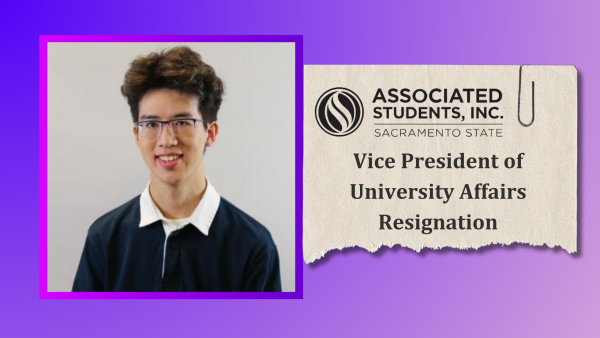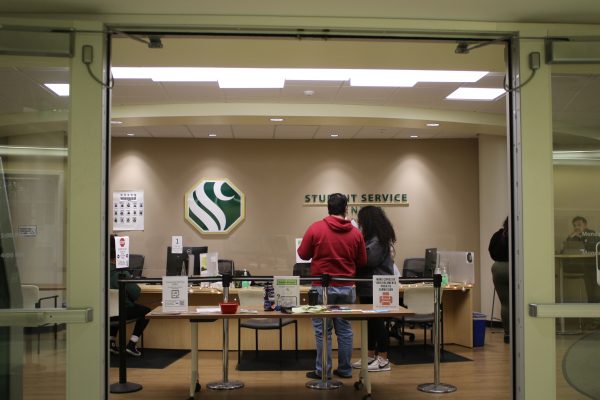Students testify for tuition trouble in front of committee
April 25, 2012
Assembly Bill 1965 was passed by the Assembly Committee on Higher Education with a 5 to 1 vote on April 17 at the state Capitol.
The bill was introduced by assemblyman Richard Pan, D-Sacramento, along with witnesses: California Faculty Association Legislative Director Shirley Kim, Sacramento State Alumna and Capitol Fellow staffing the bill Motec Sanchez and freshman government international relations major Ryan Allain.
Ex-officio members of the Board of Trustees are the governor, lieutenant governor, superintendent of public instruction, speaker of the assembly and the CSU chancellor. An ex-officio member is a person who is part of the board by virtue of holding another office.
With the elected ex-officios based out of Sacramento and their primary duties often in Long Beach, they must dedicate two days in the middle of the week to attend Board of Trustees meetings. The bill would allow ex-officios to send a designee to act on his or her behalf at the trustees meetings.
“Ex-officio members of the Board of Trustees are among the strongest supporters of students, but usually have competing governmental duties at the State Capitol in Sacramento that prevent them from being able to travel all day to attend Board meetings in Long Beach,” Pan said in a press release. “AB 1965 allows these Trustees to retain their voice on the Board by appointing trusted representatives to cast the votes that ex-officio members would have made in support of students.”
Now that the bill has been passed by the Committee on Higher Education it will go to the Assembly floor for a full vote from all 80 Assembly members. If passed, the bill will go to the Senate on Higher Education and then to the Senate floor for a full vote from all 40 State Senators.
Brian O’Hara, press secretary for Pan, said if the bill passes all of these steps it will go to Gov. Jerry Brown, who will sign or veto the bill.
AB 1965 would also allow CSU student trustees in their first year to vote at the trustees meeting if the student in their second year is not present at the meeting
“I opened my Assembly district office at Sacramento State University because I knew the power of students can make a real difference in our communities and in our Capitol,” Pan said in a press release. “It was so great to have Karen (Swain), Ryan and all the members of the Student Action Committee at the Capitol today in support of legislation that will help protect higher education for them and the students that come after them.”
Allain began his testimony by explaining to the Committee on Higher Education why it is essential to always have an ex-officio’s votes.
“California college students play a critical role in the civic life of our state. We are tomorrow’s civil servants, city council members and assembly members,” Allain said. “We need ex-officio members of the CSU Board of Trustees, who are the heart of today’s civil society, to be able to support our future at board meetings.”
Allain concluded by sharing his personal story of why beginning next semester he will move back to his hometown of Vacaville because he cannot afford to live on campus or in Sacramento.
“I am a freshman and I am already in $10,000 in debt because I chose to live on campus and have a regular life,” Allain said. “My family has had to pay out-of-state tuition for my brother who was forced to go to Oregon because CSUs’ halted transfers.”
After Pan and the other witnesses testified, six members of Sac State’s Student Action Committee expressed their support for the bill.
There were approximately nine members of the Assembly Committee on Higher Education present during the hearing of AB 1965, including Assemblyman and Chair of the Committee on Higher Education Marty Block.
“I think (AB 195) may keep the ex-officio members more engaged in the process by having regular meetings with their designees prior to trustee or region meetings to discuss the issue,” Block said. “So I will wholeheartedly support the bill and urge an ‘aye’ vote from the committee.”
The only person to speak on behalf of the opposition was Assistant Vice Chancellor of Advocacy and State Relations for the CSU Karen Zamarripa.
“What we have objections to is the assumption that ex-officio members of our Board of Trustees are not important and it’s not relevant to have them actually at the board meeting providing their expertise, input, experience and frankly their representation as elected officials,” Zamarripa said.
Zamarripa said she thinks it is a privilege and a responsibility of those elected officials as part of their jobs to represent the people of California at the Board of Trustees meetings.
“This bill seems to assume that it is going to encourage ex-officio members to participate,” Zamarripa said. “I will argue it’s going to discourage them from doing so.”
Zamarripa said she predicts the CSU will never see an elected ex-officio member at the Board of Trustees meetings again if it is not convenient.
“We don’t object to students having a voice on the board,” Zamarripa said. “But that is different than talking about an elected official who was asked by the state of California and the voters to participate in the governance of the two greatest higher education institutions in the country and that’s the CSU and the UC.”
Assemblywoman and Vice Chair of the Committee on Higher Education Kristin Olsen, R-Modesto, agreed the bill could be taken advantage of by ex-officios. Olsen was the only member to give a “no” vote.
“Certainly we can’t have somebody to vote in our place. And while I realize this is a full-time position, even when I was a city council member I couldn’t designate someone to vote for me,” Olsen said. “That would be outrageous.”
Assemblyman Anthony Portantino, D-Pasadena, expressed his support of the bill when committee members were allowed to ask questions and make comments.
“I don’t think in theory (AB 1965) will have a chilling effect on attendance, but under the current system we know from the statistics that the ex-officio members (attendance) isn’t always good,” Portantino said. “So to have more oversight, more input and more protections this is a bill that should pass.”
Alyssa Sanguinetti can be reached at [email protected].









































































































































